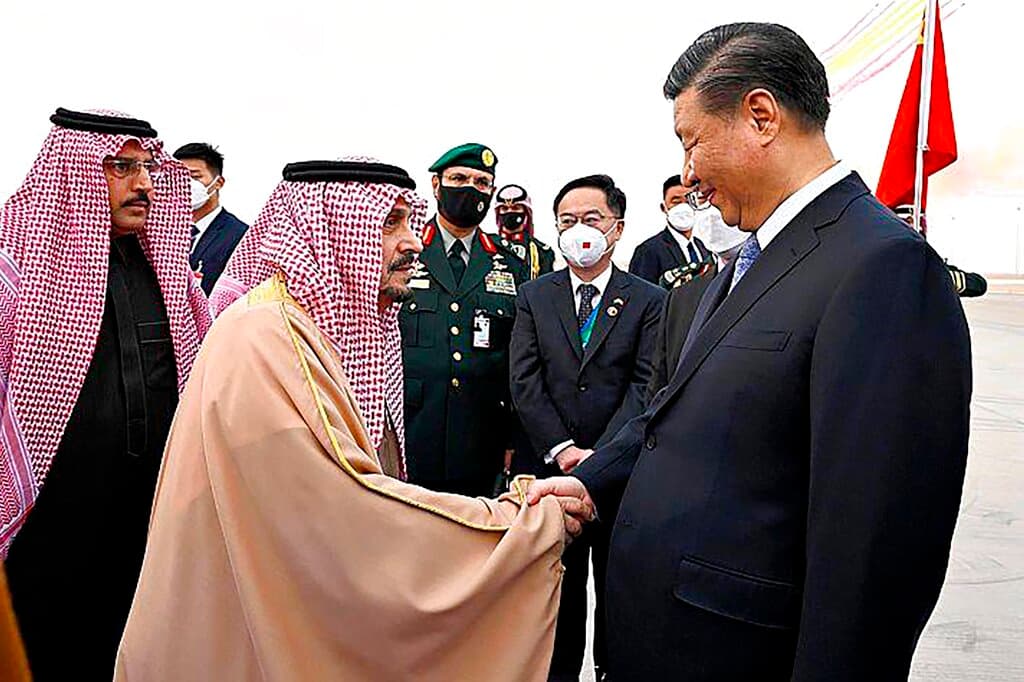China’s Xi Sings Songs Saudis Want To Hear
The Communist chief’s studied willingness to avoid lecturing the crown prince and instead help him advance Saudi interests is much welcomed in Riyadh, and stands in direct contrast to the approach of President Biden.

Beijing’s ruler may have flown to Saudi Arabia in an American-made Boeing, but Xi Jinping’s landing there Wednesday represents a major shift away from traditional Mideast alliances with the United States.
Mr. Xi got the red carpet treatment for the start of a four-day visit that follows President Biden’s in July, when the American leader awkwardly attempted to fist-bump Washington back into Riyadh’s good graces. Mr. Xi’s approach — to avoid lecturing the crown prince, Mohammed bin Salman, and instead help him advance Saudi interests — is much welcomed in Riyadh.
Mr. Xi’s visit is “a landmark in the history of Sino-Arab relations,” Beijing’s foreign ministry spokeswoman, Mao Ning, told reporters earlier this week. During this week’s summit with regional leaders starring the crown prince, widely known as MbS, Mr. Xi is expected to sign agreements for projects amounting to $30 billion, according to the Saudi news agency SPA.
Tightening relations with Beijing is “definitely a smart move for Riyadh,” a diplomat who often travels to the region said, speaking on condition of anonymity. “Biden has done his utmost to sever relations with MbS, so the Saudis and their Gulf partners are looking for alternatives.”
During his 2020 presidential run, Mr. Biden vowed to turn Saudi Arabia, an American ally since the end of World War II, into a “pariah state” over the murder of the Washington Post’s Jamal Khashoggi. Early in his presidency he scolded the crown prince. That was followed by Washington limiting arms sales to Riyadh over the conduct of the Yemen war, while it pushed hard to advance diplomacy with the top Saudi regional rival, Iran.
Now Mr. Xi comes in as “the good cop,” a China researcher at Tel Aviv’s Institute for National Security Studies, Tuvia Gering, told the Sun. Mr. Xi’s message to the Saudis “is that unlike the U.S., we do not interfere in your internal affairs, we only offer solutions,” Mr. Gering said.
Beijing has done its homework, studying Arab Mideast complaints about America and the West. By now the Chinese know “all the pressure points” and are using them to promote alliances, Mr. Gering added. From deeply seated Arab resentment about past Western colonialism to Mr. Biden’s “sanctimonious preaching about human rights,” the Saudis and their Gulf allies are welcoming when Chinese diplomats tell them that they are different.
China is already the world’s largest buyer of Saudi oil, while the Communist country is the kingdom’s largest trading partner. In the last two decades Chinese investments in Saudi Arabia amounted to more than $107 billion, according to the Financial Times. Meanwhile, America’s trade with Saudi Arabia last year was $29 billion, down from $76 billion a decade ago
An average Saudi man holds a Chinese phone that uses a Huawei 5G network, and drives a Chinese-made Geely car while his son in the backseat is posting a message on TikTok, Mr. Gering says.
The decades-old alliance between Washington and Riyadh has been based on the premise that the Saudis would assure America’s energy needs, while the United States would provide security to protect the House of Saud from foreign and domestic enemies.
Since the shale revolution, however, America’s reliance on Saudi oil has been much reduced. Riyadh, meanwhile, is increasingly skeptical of America’s security guarantees. Washington barely lifted a finger in March after Yemeni-launched Iranian-made rockets hit an Aramco oil facility.
Yet, as energy costs are rising sharply at home, Mr. Biden is learning that he may need to rescue America’s alliance with the Saudis after all. In July he traveled to Riyadh to tell Arab leaders that “the U.S. is not going anywhere,” and that “we will not walk away and leave a vacuum to be filled by China, Russia, or Iran.” More recently, the Biden administration determined that as a head of state, Prince Mohammed has immunity from prosecution in America.
Meanwhile, the Saudis and their Gulf allies remain largely reliant on American security, with 60,000 American troops based in Saudi Arabia. Communist China’s nearest troop presence amounts to no more than 1,000 soldiers stationed at Djibouti, just across the Red Sea from the Arabian peninsula.
Yet, even in the field of security Beijing is muscling its way into the Mideast. During an international forum at Beijing last month, state officials called for “a new security architecture in the Middle East.” While regional leaders prefer American-made arms, Beijing is selling them plenty of drones, missiles, and telecommunication products with a military dimension.
Many of those products, military and otherwise, are cheaper than the ones America supplies to its allies. They also come with fewer strings attached, or none at all. Unlike Mr. Biden, who has vowed to place human rights at the center of his foreign policy, Mr. Xi is an autocrat, who expects Arabs to turn their backs to his own atrocities in Tibet, Hong Kong, and perhaps elsewhere.
For now, the Saudis insist on getting paid for oil with American dollars. The turning point in the 21st century’s version of the Cold War will arrive when Riyadh starts taking Chinese currency instead. By then, Mr. Xi could replace his Boeing aircraft with a Chinese-made jet.

